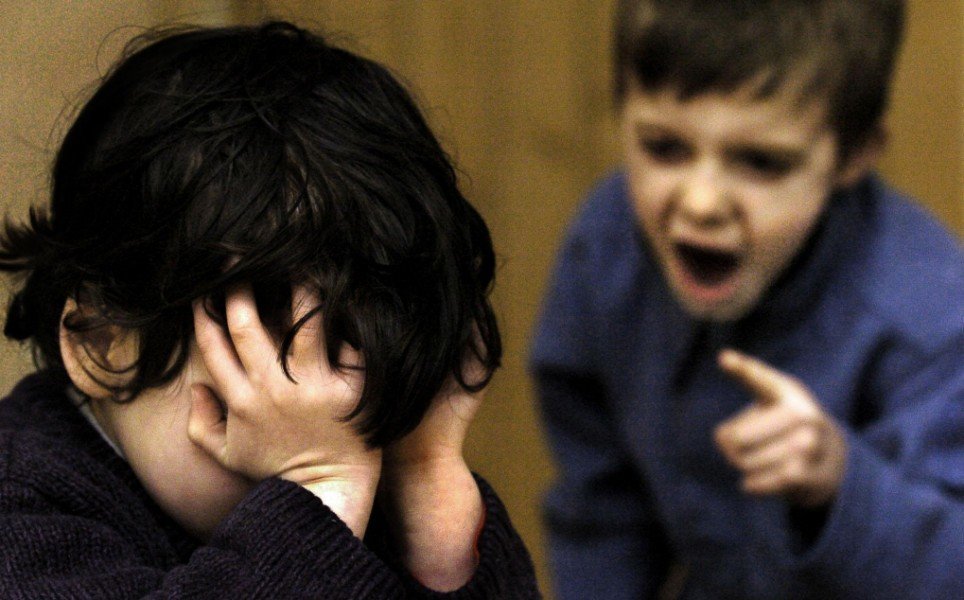
‘Sticks and stones will break my bones, but names will never hurt me.’
True or false?
False, according to what now passes for psychiatric expertise.
One prominent media psychiatrist (Dr. Keith Ablow of Fox News) even goes so far as to end the distinction between verbal and physical abuse. To Ablow, they’re one and the same. In fact, he claims, verbal abuse or bullying is even worse than physical violence:
The word “bullying” should probably be dropped from our lexicon. “Bullying” sounds too innocuous—a lot like teasing. It was born on grammar school playgrounds and is somehow still used in the context of the Internet. The word itself contributes to mainstreaming the behavior and even condoning it. The right term is “psychological assault.”
You’re dead wrong, Dr. Ablow.
A very important distinction exists between physical assault and verbal harassment.
Physical assault is an imposition you cannot escape. A person is invading your literal, physical space with no consent on your part. Such invasion is unacceptable and, in the worst case, can end your life.
How or whether to respond to verbal abuse or harassment is optional. You have choices.
For example, ‘Consider the source. What does it say about this person that he or she needs and wants to put me down in this way?’
Or: ‘So what if he says this about me? Is it true? Is it valid?’
Bullying or harassment, by definition, is deliberately distorted and false. Why give it any power at all?
I’m not denying that teachers or parents should attempt to address bullying rationally, when it occurs among children. But part of the way to address it is by helping the child understand the moral and psychological impotence of a bully.
You don’t help a child by teaching him or her that yes, names will ‘break your bones’ just as easily as sticks and stones. Doing so will encourage that child to grow into an adult who cowers at the verbal intimidation of others, going through life like a perpetual victim.
Dr. Ablow references the case of 12-year-old Rebecca Sedwick, who killed herself following a prolonged period of online bullying by two other girls.
Can you hold someone responsible for ‘making’ you commit suicide, if that’s your choice, however emotionally driven? I don’t honestly know how you can.
The behavior of the bullies may be abhorrent. But is a person who is unable or unwilling to stand up to those bullies in some way—if only through ignoring them—completely unaccountable? Do the bullies coerce you to kill yourself, if that’s what you choose to do?
This is the question nobody wants to even ask, because people fear being viewed as unkind. But it’s the truth we’re seeking here.
See if you can find the unstated premise in Dr. Ablow’s statements:
As it turns out, a significant percentage of human beings cannot insulate themselves psychologically from chronic, mean-spirited criticism, taunting and threats of being marginalized socially. This depersonalization focused on them can lead them to feel helpless, hopeless and desperate to end their pain, even if that means ending their lives.
Does the person being bullied have no capacity for putting the bullying into perspective? Or do the bullies have the same power as a criminal bearing a gun or a knife?
Ablow doesn’t say, but the implication is clear: Physical and verbal ‘violence’ are all the same. If someone calls you names, they’re assaulting you no less than if they pull out a gun or a weapon.
Ablow’s position has dangerous implications socially and legally, as well. He writes:
We are social creatures. We care whether we are understood. We hope we are liked. We need friends. We value our reputations. And when bullies target those elements of the human psyche, which are as real as skin, muscle or bone, they are committing assault.
Believe it or not, this is a recipe for dictatorship. If I may claim that your words or phrases are harassment, and therefore the same as physical violence, under the law, then where is the boundary?
For example, if you hold a political, social or religious/philosophical position I consider hateful and offensive, then may I prosecute you, under the law, for committing ‘assault’ against my sensibilities? And not because of anything you have actually done? Dr. Ablow may deny it, but this is where his premise takes us–and there plenty of lawyers, judges and others who would be quite happy to take us there.
We are social creatures, but we’re individuals first and foremost. Even when we socially interact, we do so as individuals. We’re individuals with the capacity for thinking, reasoning, putting things into perspective and analyzing things critically. While others must be restrained or punished when they physically impair or coerce us, nobody is coercing us by spewing out untrue or unfounded statements (or ones we perceive as such.)
Dr. Ablow’s position would have us believe that we’re essentially helpless against the torrent of verbal hostility that comes from a psychologically twisted, dark soul like a bully. He would have us believe that we’re incapable of considering the source of the attacks—and ignoring it, or even standing up to it. Like so many others in my profession (regrettably), he would turn us all into permanently helpless children, requiring emotional accommodation for the duration of our adult lives.
Sticks and stones do break our bones, but names need never hurt us—not unless we let them.
[Source of Dr. Ablow’s comments is FoxNews.com 10-17-13]
Be sure to “friend” Dr. Hurd on Facebook. Search under “Michael Hurd” (Rehoboth Beach DE). Get up-to-the-minute postings, recommended articles and links, and engage in back-and-forth discussion with Dr. Hurd on topics of interest.
